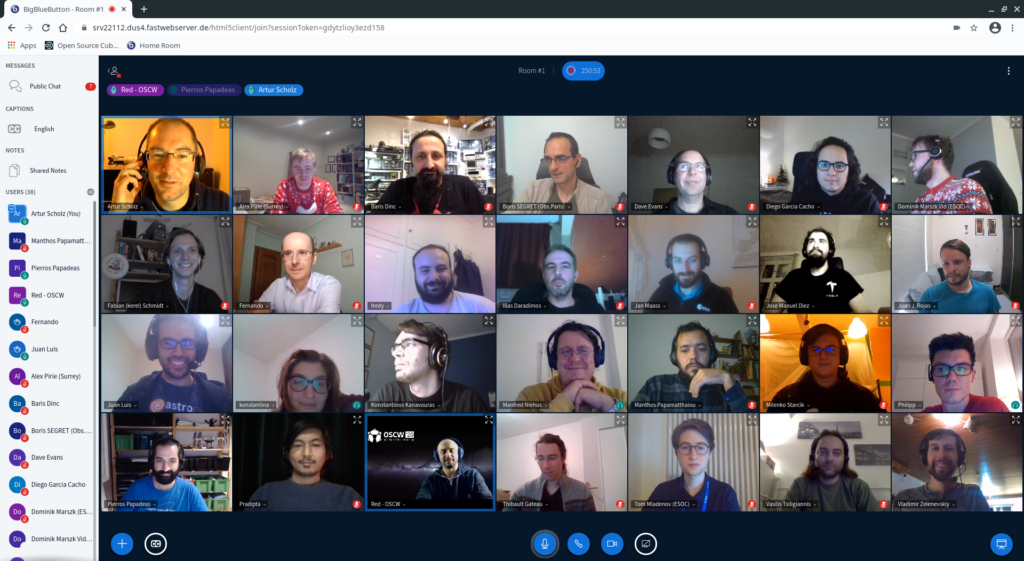The Open Source CubeSat Workshop 2020!
The Open Source CubeSat Workshop is a yearly event that brings together enthusiasts from the fields of space technology, engineering, CubeSats, mission control and analysis, and of course, Open Source. The event has been around for four years and has been gaining continuous success and building rapport among Space and Open Source Technology supporters. In an attempt to maintain stability in a rather unpredictable year when a pandemic has been sweeping the globe, the event was decided to take place online. We found no better way to guarantee the safety of attendees and speakers alike, than participating in an online event from the comfort and safety of our home. And that brought on the Open Source CubeSat Workshop 2020 – online edition; with a strong focus on sharing ideas and promoting collaboration; even when confined at home on different meridians of the planet.

The Event
On the 12th and 13th of December, the Open Source CubeSat Workshop 2020 kicked off online! The event was streamed live on the Libre Space Foundation YouTube Channel and it brought together people from different continents, backgrounds and disciplines. At the same time conversations and insightful discussions were taking place on the YouTube Chat and on dedicated matrix channels (via element.io), where information provided by speakers (tips/source code/awesome list) was also shared. A community buzzing of ideas for cooperation that you can join any time of the year and explore collaboration potentials.
The event featured two Rooms where presentations took place in parallel; fascinating lightning talks and detailed tutorials. Overall there were 20 presentations, 12 lightning talks and 5 tutorials and here is the playlist with all the videos from the event.
The Open Source CubeSat Workshop 2020 was a fun and informative event where knowledge and great ideas were shared openly. Fascinating discussions and Q&As provided insightful approaches and there were some interesting conclusions.
Key take away
OSCW is a great occasion, every year, to realize the immense impact of the open-source projects that compose the space industry, by playing an important role in enabling access to key technologies for creating and supporting space missions. Every year we see gaps being filled like the DOCKS software suite, managed by Observatoire de Paris (CCERES), offering a complete set of tools for space mission profiling. Thanks to the feedback provided by the community, the project has been restructured, to feature an easier interface and understanding of its different tools. SatNOGS project, the Satellite Network of Ground Stations, is realized by volunteers across the globe and it continues to expand. Coverage expansion, the well-scaling infrastructure and its evolution were presented while the project maintains user-friendly interfaces for flight control teams to store, access and view their spacecraft telemetry. SatNOGS puts the finger on key challenges (satellite detection, identification and tracking, easy deployment of SDR-based ground stations, and ground infrastructure). OpenSatCom was also presented at the event. This is an activity of the European Space Agency managed by the Libre Space Foundation; the latter has recently produced a resourceful report about Open Source, development methodology models for satellite communications.
The workshop also featured a lot of tutorials and information about the things you need to know if you are into creating your own smallsat mission or managing an existing one. It included everything from open-source embedded software and implementation of ECSS standards to the latest update on how to propagate an orbit and why you have to say goodbye to TLEs; as well as how to use machine learning to analyze your operations data.
There were plenty of other key projects presented like MetaSat or the standardization of PC/104 connectors with the Librecube initiative that you can retrieve from the contributions list.
OSCW is also the siege of numerous shared ideas as all interventions do trigger one’s imagination. Lightning talks provide great inspiration. They are the perfect example of how you can quickly get a team of contributors for a project like a ground station in a backpack. Or they can inspire the birth of an idea which was not even on the initial list and it was formed on the spot. By raising the interest of the attendees during a talk, you get to inspire people who wish to contribute to your project. It is because of this that often you can find somebody saying “I’ve got something I can share with you and we can make it”; such as the air-bearing testing equipment for testing your ADCS (during the astonishing liquid metal-based pico reaction “wheels”).
Acknowledgements
Though this year the event was different, as it went fully online, it was indeed a successful one! As it did manage to gather an online community of enthusiasts who are dedicated to Open Source, Technology and Space. It managed to overcome boundaries and a pandemic and to allow individuals from around the globe to unite under their shared interest. For this, we would like to thank everyone! The attendees for forming a friendly community of great diversity and knowledge, the speakers and presenters for creating great interactions and sharing insights, the contributors for enabling a smooth experience and the OSCW committee for putting everything together and overseeing the event. We would also like to thank the teams behind Indico (our conference management tool), The Big Blue Button (amazingly smooth video conferencing, with multi-user whiteboarding and break sessions), Element.io and Matrix for powering the conversations, links & file-sharing of this year’s iteration of The Open Source CubeSat Workshop 2020!
Until we meet again, next year and hopefully in person, feel free to enjoy the recordings of this year’s event and go through the presentations and talks. They are a great source of knowledge and you can shuffle through them and acquire great insight.
In the meantime, stay safe and connected!
